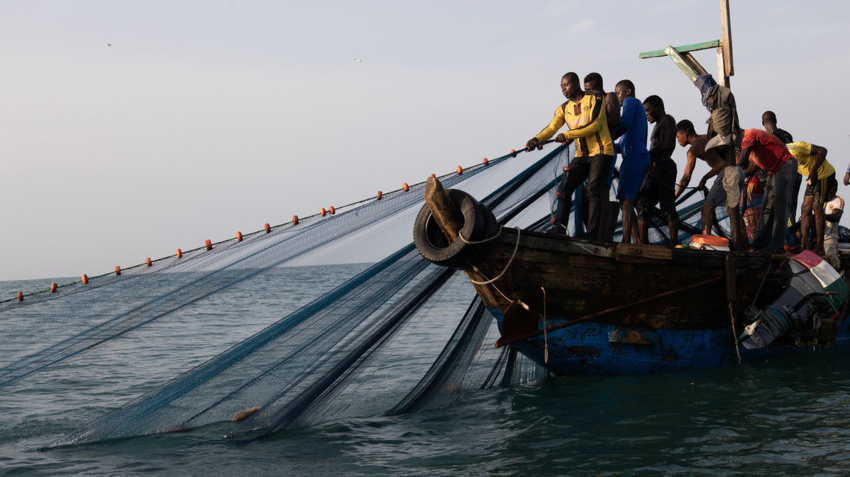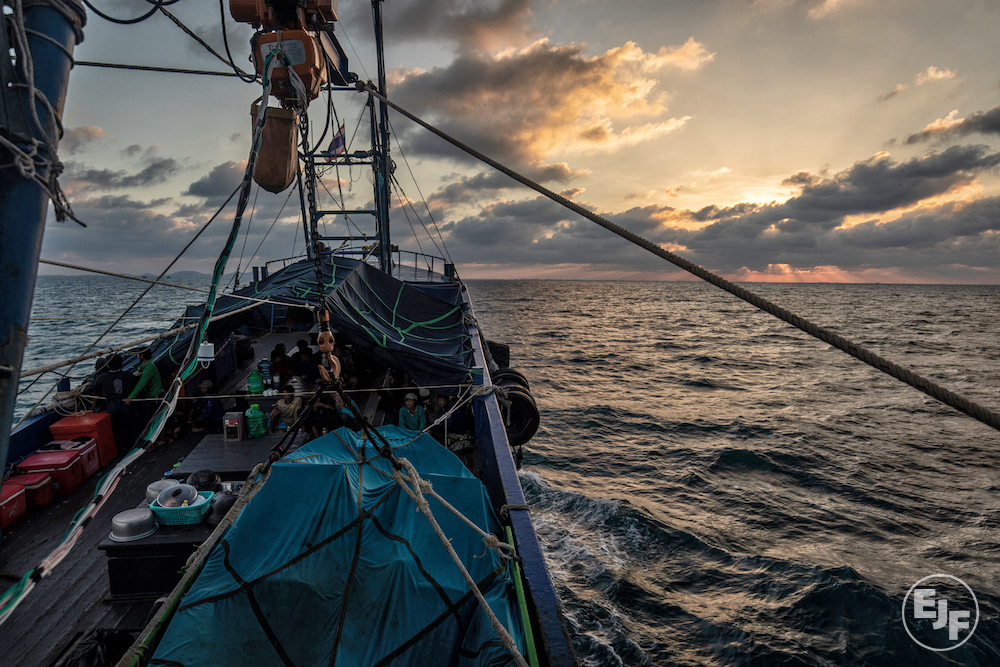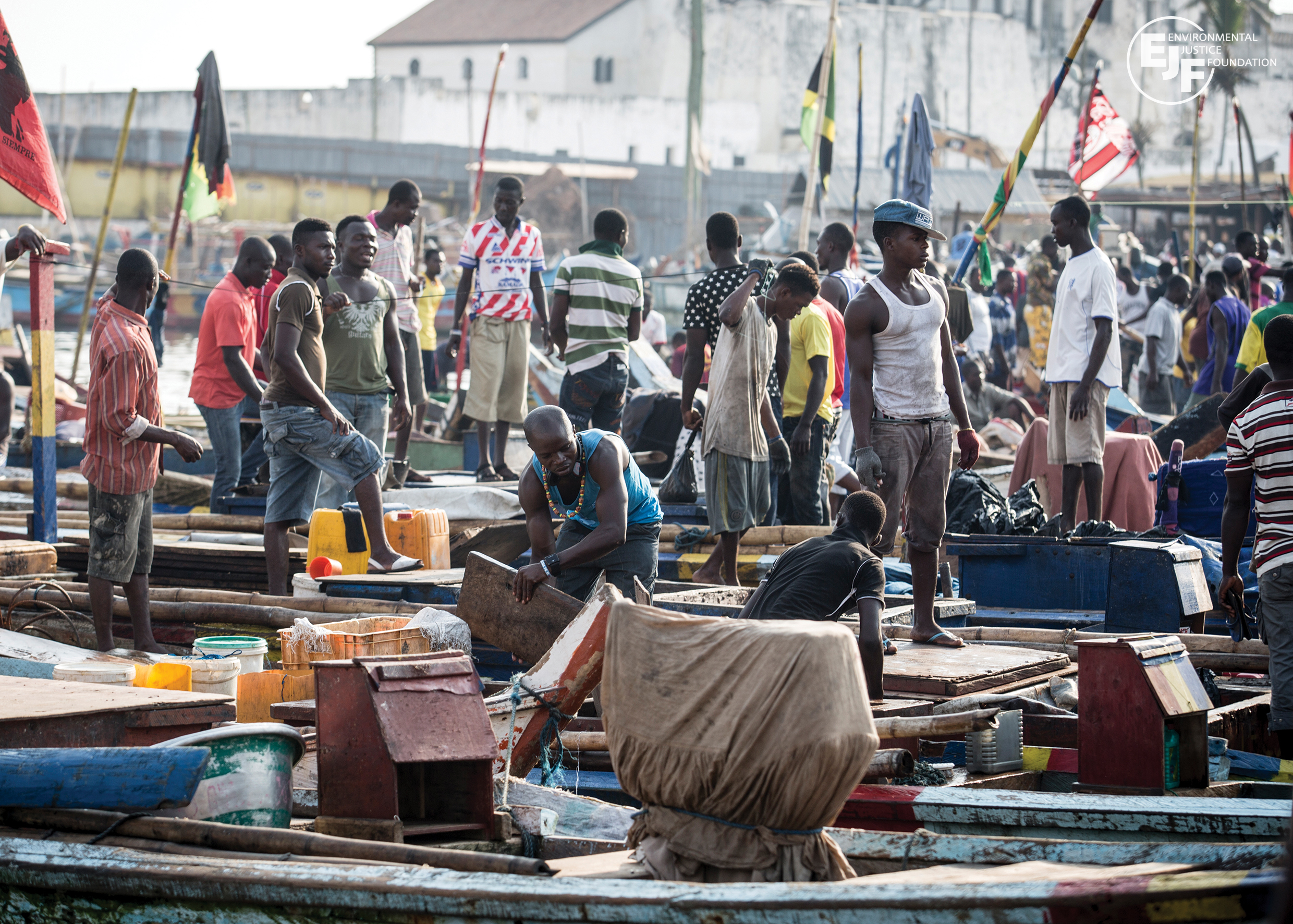
To save fish stocks Ghana must enshrine transparency in law
Transparency must be improved to eradicate illegal fishing and prevent the collapse of Ghana’s fishing industry, says a new report from the Far Dwuma Nkɔdo project, laying out key measures that can be implemented immediately by the government. Transparency is the most effective means to tackle these issues and provides much-needed accountability in a sector facing unprecedented challenges, as fish stocks plunge to their lowest recorded levels.
The report, published by the Environmental Justice Foundation (EJF) and Hen Mpoano under the EU-funded Far Dwuma Nkɔdo project, shows that the Ghanaian fishing industry suffers from a shocking lack of transparency. This allows illegal operators to disguise the identity, ownership and history of fishing vessels, avoiding detection and sanctions. As a result, illegal fishing is rife and vast over-capacity in the fishing fleet continues to decimate fish stocks.
Despite Ghana’s laws clearly forbidding any foreign ownership or control of industrial trawl vessels flying its flag, Chinese companies operate extensively through Ghanaian ‘front’ companies, a previous report by EJF revealed. Using opaque corporate structures, they import their vessels, register and obtain a licence to fish.
These activities, designed to circumvent laws and facilitate illegal operations, are enabled by a complete lack of transparency including disguising who is responsible for illegal actions and who controls and benefits from Ghana’s industrial trawl fleet. In 2015, 90% of industrial trawl vessels licensed in Ghana were built in China, and 95% were captained by Chinese nationals.
The lack of transparency in the fisheries sector can also foster corruption and significant loss of state revenue. According to the report, fines for illegal fishing are often negotiated – through opaque out-of-court settlements – to a fraction of the US$1 million minimum set out in the law. Fishing licence fees in Ghana are substantially lower than in other West African countries.
Improving transparency would play a crucial part in eradicating the illegal fishing that is driving the country’s fish stocks to extinction and impoverishing local communities, says the report. Many of the measures – such as publishing details of fishing licences and their conditions – are cheap, simple, and can be implemented immediately.
To bring about meaningful change, the report recommends that the Ghanaian government should:
- Allow for external scrutiny of progress towards achieving targets for sustainable fisheries management.
- Invest the revenue from licence fees and fines in the sustainable development of the sector and publish the details.
- Identify the true beneficiaries and perpetrators of large-scale and organized illegal fishing and hold them publicly accountable for their actions.
- Make vessel monitoring data publicly available, to improve oversight of Ghanaian fishing activities, both in national waters and in neighbouring countries.
The on-going revision of the 2002 Fisheries Act provides a unique opportunity to put Ghana’s fisheries on the road to sustainability by enshrining these crucial measures into national law.
“Transparency in Ghana’s fishing industry is vital to thousands of people’s livelihoods, and the food security of the entire nation,” says EJF Executive Director Steve Trent. “It is a low-cost, highly effective means to tackle illegal fishing, improve accountability and support meaningful participation in decision-making.”
“Incomes of small-scale fishers have dropped by as much as 40% in the last 10-15 years, and Ghana is now forced to import more than half of fish consumed,” says Director of Hen Mpoano Kofi Agbogah. “Access to credible information is essential for informed participation in fisheries management. Together, transparency and participation increase accountability of government institutions and support the fight against corruption.”
According to Mr Agbogah: “Revenue reporting and audits have greatly increased revenue to government from our oil, gas and mining sectors. As our fisheries face unprecedented challenges, it is more than time for the sector to follow suit.”
Notes for editors
Read the report: Securing equitable and sustainable fisheries
Read the EJF report: China’s hidden fleet in West Africa: a spotlight on illegal practices within Ghana’s industrial trawl sector
Key facts:
- New vessels have continued to arrive from China, despite a February 2012 moratorium on new industrial trawlers entering Ghanaian waters to address severe depletion of fish stocks. Of the 68 industrial trawl vessels licensed to fish in Ghana from March-June 2018, at least half were built in 2013 or later, after the moratorium on new or replacement vessels came into effect. The list of vessels licensed by the Ministry of Fisheries and Aquaculture Development has not been available to the public since July 2018.
- Vessels have engaged in illegal and unreported fishing on a massive scale, targeting fish reserved for small-scale fishers and selling them to specially-adapted canoes out at sea – a hugely damaging practice known as ‘saiko’. A recent study by EJF and Hen Mpoano estimated that around 100,000 metric tonnes of fish were traded illegally through saiko in 2017, with an estimated landed value of US$34-65 million. In 2017, industrial trawlers reported just 67,000 metric tonnes of “official” catches to the Fisheries Commission.
About Far Dwuma Nkɔdo:
The three-year (2017-2019) project is being implemented by the Environmental Justice Foundation (EJF) and Hen Mpoano with the financial support of the European Union and German Federal Ministry for Economic Cooperation and Development (BMZ). As part of this project, EJF and Hen Mpoano are working to help drive a reduction in illegal fishing, and give local fishers a voice in the process to build a more sustainable fishing sector:
- Through a unique combination of local surveillance and remote monitoring, we are strengthening the monitoring and reporting of illegal fishing, and empowering local communities to document illicit fishing activities.
- We are working to empower small-scale fishers, vulnerable and marginalised groups to articulate their interests in fisheries reforms and implement fisheries co-management.
- We are promoting alternative livelihood options for small-scale fishing communities, helping them to diversify their local economies and to reduce their dependence on fishing.
For more information, visit www.ejfoundation.org or www.henmpoano.org
The Environmental Justice Foundation is an international non-governmental organisation working to protect the environment and defend human rights. EJF is a charity registered in England and Wales (1088128). www.ejfoundation.org
Hen Mpoano is a non-profit organization based in Ghana. Its vision is for inclusive and integrated management of Ghana’s coastal and marine ecosystems to generate long-term socio-economic and ecological benefits. www.henmpoano.org
Contacts:
Daisy Brickhill - EJF Press & Communications Coordinator
daisy.brickhill@ejfoundation.org
Tel: +447871946911
Charles Smith – Communications Officer (EJF Ghana)
charles.smith@ejfoundation.org
Tel: +233245412531
SIGN UP FOR OUR EMAILS AND STAY UP TO DATE WITH EJF

